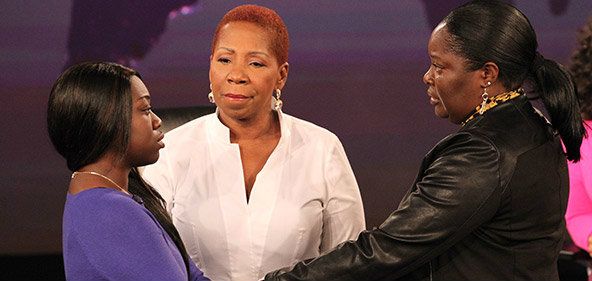Oprah’s Lifeclass on Colorism Offers Important Takeaways

by Sarah L. Webb
If you haven’t already heard the buzz around Oprah’s Lifeclass on colorism with special guest Iyanla Vanzant, please know that it happened! Most importantly, it was a positive step toward healing, with two essential takeaways we all can learn from.
Colorism is essentially prejudiced attitudes or discriminatory actions against people based on features such as skin color or hair texture. The prejudice can occur among people of the same race or among people of different races.
Oprah and her team were compelled to do a Lifeclass segment on colorism after the response they received when OWN aired Bill Duke’s documentary Dark Girls.
The live recording of this Lifeclass episode was streamed online in early December. I was fortunate enough to watch the uncut discussion, which lasted nearly two hours with no commercials.
The edited and packaged television version aired on Friday, Jan. 10. Considering the time constraints of television, I think the made-for-TV version actually did some justice to the original conversation.
What Oprah and Iyanla tried to do is open the show by defining the issue and pointing to some historical roots of it. They also established the fact that while their discussion focused on African Americans, colorism is very much a problem in other countries and cultures as well.
Then the audience got to speak about their individual experiences, and that’s when the emotional effects of colorism came through most clearly. Women of all skin tones spoke with frustration, tears, hope, guilt, insight, and any number of feelings. This was the bulk of the show― individual women trying to share their side of the story and negotiate discrepancies in what they experienced versus what others experienced.
One of the best moments was near the beginning of the show when Iyanla called two women onto the stage to face each other. One woman had light skin. The other woman had dark skin. Each woman essentially stated that she was rejected by other African Americans because of their skin color.
And that brings me to the essential takeaways of the episode.
“Everyone goes through something.”
A significant part of the show featured a 19-year-old girl with dark skin. She told the story of how she was bullied and demeaned because of her dark skin tone and features. She openly expressed her inability to see any beauty in dark skin, which meant she saw no beauty in herself.
At the end of the show, Oprah asked her what she’d learned from the discussion. Her reply was that, “Everyone goes through something.”
Very often, colorism is labeled a dark-skinned girl’s problem, but it actually affects people of all skin colors.
However, people’s experiences are not identical, which is the basis of the second takeaway.
We need to validate each other’s experiences.
This statement was first made by a light-skinned audience member and was emphasized by Iyanla and Oprah throughout the show.
We often get defensive when other people share experiences that seem to contradict or overshadow our own experiences or that might appear to implicate us in some way.
Iyanla urged us to stop making generalizations (Light-skinned girls always… Dark-skinned girls always…). She noted that it’s possible to share our stories without suggesting or insisting that our experience is universal or exclusively true.
Personally, my favorite piece of advice came from Oprah when she said: “You don’t have to make someone else wrong in order for you to be right.”
We could make a lot of progress as a community of African American women if we came to the table without the defensiveness and merely said, “I hear you, sister.”
That’s really what we all want--to be heard, seen, acknowledged.
In my own life, it was easy for me to embrace “the other story” because my biological sister is light skinned and I’m dark skinned. We had natural compassion and love for each other that made it easy to empathize with each other’s opposite experiences.
That’s what I’d like to close with. If the word “love” is too much, then let’s at least consider listening to each other with more empathy and compassion. If we’re all willing to do that, then no one has to feel as though their experience is being denied. Instead, we’ll have a better understanding of how colorism affects all of us.
Related:
Fair Skin at What Cost?: The Toxic Effects of Skin Bleaching
Dark Girls….and Light Girls and Brown Girls

No comments: